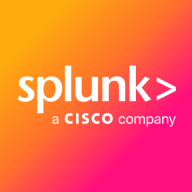

Splunk Enterprise Security and Netsurion are significant players in the cybersecurity space. Splunk Enterprise Security is seen as having the upper hand due to its superior features and capabilities, a pivotal investment despite its higher cost.
Features: Splunk Enterprise Security excels in advanced data analytics, threat detection, and customizable dashboards. It stands out for offering deep security visibility and robust integration capabilities, providing comprehensive feature offerings ideal for complex environments. Netsurion is known for its managed threat protection and cost-effective security monitoring solutions.
Room for Improvement: Splunk Enterprise Security's deployment can be complex and requires technical expertise, which might not be convenient for all organizations. Additionally, Splunk is more expensive, which could limit accessibility for smaller businesses. Netsurion could improve its feature set to match Splunk's broad capabilities and further enhance its integration with third-party security applications.
Ease of Deployment and Customer Service: Splunk Enterprise Security offers a robust but complex deployment model requiring technical expertise. Netsurion provides a simpler, more streamlined deployment and is praised for its strong customer support and managed service options, making it attractive for organizations with limited internal IT resources.
Pricing and ROI: Splunk Enterprise Security, despite its higher initial cost due to extensive features, can offer a strong ROI if its capabilities are fully utilized. Netsurion provides a more cost-efficient entry point, delivering an immediate ROI for businesses focused on essential security features without significant infrastructure investment. Its affordability makes it appealing for smaller organizations or those with budget constraints.
The documentation for Splunk Enterprise Security is outstanding. It is well-organized and easy to access.
We couldn't calculate what would have been the cost if they had actually gotten compromised; however, they were in the process, so every investment was returned immediately.
On average, my SecOps team takes probably at least a quarter of the time, if not more, to remediate security incidents with Splunk Enterprise Security compared to our previous solution.
We have paid for Splunk support, and we’re not on the free tier hoping for assistance; we are a significant customer and invest a lot in this service.
I have had nothing but good experiences with Splunk support, receiving timely and helpful replies.
We've had great customer success managers who have helped us navigate scaling from 600 gigs to 30 terabytes.
We currently rely on disaster recovery and backup recovery, which takes time to recover, during which you're basically blind, so I'm pushing my leadership team to switch over to a clustering environment for constant availability.
It is one of the things that separates it from other tooling, and if not, it is the most scalable solution out there.
They struggle a bit with pure virtual environments, but in terms of how much they can handle, it is pretty good.
They test it very thoroughly before release, and our customers have Splunk running for months without issues.
Splunk has been very reliable and very consistent.
We need more SMEs, and there is no mechanism to tell us about indexer or search head issues.
Improving the infrastructure behind Splunk Enterprise Security is vital—enhanced cores, CPUs, and memory should be prioritized to support better processing power.
Splunk Enterprise Security is not something that automatically picks things; you have to set up use cases, update data models, and link the right use cases to the right data models for those detections to happen.
For any future enhancements or features, such as MLTK and SOAR platform integration, we need more visibility, training, and certification for the skilled professionals who are working.
I saw clients spend two million dollars a year just feeding data into the Splunk solution.
The platform requires significant financial investment and resources, making it expensive despite its comprehensive features.
I find it to be affordable, which is why every industry uses it.
This capability is useful for performance monitoring and issue identification.
I assess Splunk Enterprise Security's insider threat detection capabilities for helping to find unknown threats and anomalous user behavior as great.
Splunk Enterprise Security provides the foundation for unified threat detection, investigation, and response, enabling fast identification of critical issues.
| Product | Market Share (%) |
|---|---|
| Splunk Enterprise Security | 7.1% |
| Netsurion | 0.7% |
| Other | 92.2% |

| Company Size | Count |
|---|---|
| Small Business | 10 |
| Midsize Enterprise | 7 |
| Large Enterprise | 7 |
| Company Size | Count |
|---|---|
| Small Business | 109 |
| Midsize Enterprise | 50 |
| Large Enterprise | 264 |
Netsurion offers robust SIEM capabilities enhanced by managed services, facilitating efficient threat identification and response with real-time alerts and comprehensive reporting.
Netsurion stands out for its integration of SIEM, IDS, and vulnerability management. Its real-time threat alerts and dashboards enhance user response capabilities. With centralized logging from Windows, Linux, Cisco devices, firewalls, and Active Directory, Netsurion enables effective compliance support for HIPAA and PCI standards. Managed Threat Protection with the embedded MITRE ATT&CK Framework enhances threat intelligence, while its evolving interface aims to improve user interactions. However, some users find deployment and searching challenging, pointing to areas for improvement.
What are Netsurion's key features?Netsurion is frequently implemented in industries requiring comprehensive security monitoring and compliance, such as healthcare and finance. It aids businesses in consolidating security efforts, offering insights into user activities and system changes, an asset for companies lacking substantial internal resources.
Splunk Enterprise Security delivers powerful log management, rapid searches, and intuitive dashboards, enhancing real-time analytics and security measures. Its advanced machine learning and wide system compatibility streamline threat detection and incident response across diverse IT environments.
Splunk Enterprise Security stands out in security operations with robust features like comprehensive threat intelligence and seamless data integration. Its real-time analytics and customizable queries enable proactive threat analysis and efficient incident response. Integration with multiple third-party feeds allows detailed threat correlation and streamlined data visualization. Users find the intuitive UI and broad compatibility support efficient threat detection while reducing false positives. Despite its strengths, areas such as visualization capabilities and integration processes with cloud environments need enhancement. Users face a high learning curve, and improvements in automation, AI, documentation, and training are desired to maximize its potential.
What Are the Key Features of Splunk Enterprise Security?In specific industries like finance and healthcare, Splunk Enterprise Security is instrumental for log aggregation, SIEM functionalities, and compliance monitoring. Companies leverage its capabilities for proactive threat analysis and response, ensuring comprehensive security monitoring and integration with various tools for heightened operational intelligence.
We monitor all Security Information and Event Management (SIEM) reviews to prevent fraudulent reviews and keep review quality high. We do not post reviews by company employees or direct competitors. We validate each review for authenticity via cross-reference with LinkedIn, and personal follow-up with the reviewer when necessary.